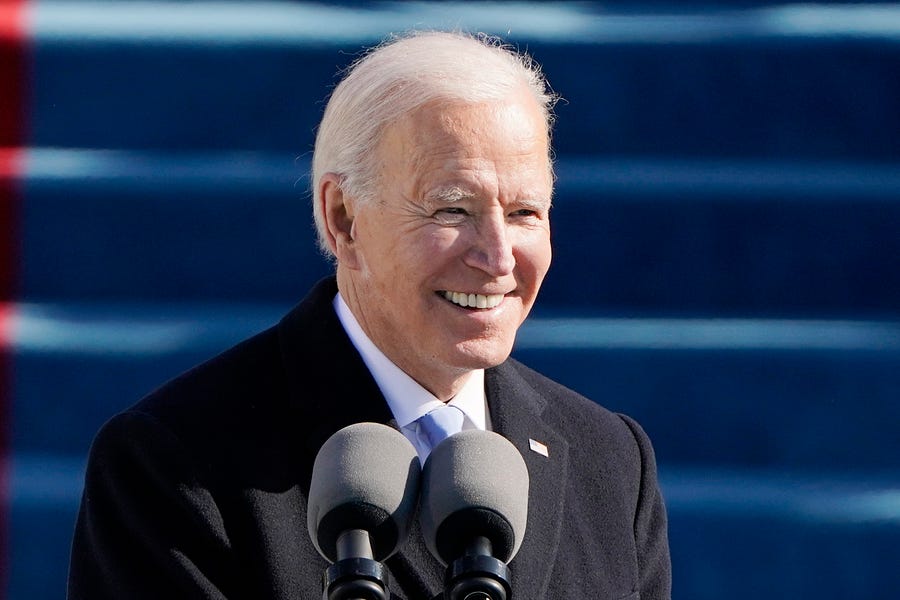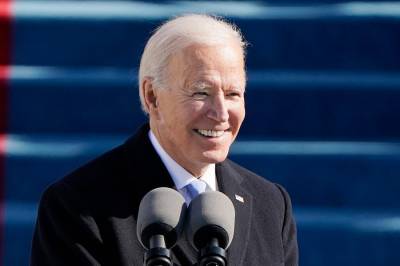Well, we’re done with all of that.
In Donald Trump’s inaugural address he proclaimed, “This American carnage stops right here and right now.”
On that very spot, thanks to Trump’s last meaningful public act, some of his supporters unleashed carnage (in the name of America and Donald Trump) on the American seat of government.
It was a bit on the nose for real life, but cinematically it was almost perfect.
But now we have a new president, and as much as I will disagree with Joe Biden, I am deeply relieved Trump is out of office. I honestly admit I can’t understand people who feel no relief whatsoever about this fact.
Biden’s first inaugural.
Let’s dispense with the punditry. I thought it was a good inaugural address. The whole inaugural—indeed, the whole period since Trump lost his Twitter account during his effort to steal the election—calls to mind that weird sensation of conspicuous silence, as when a jackhammer or car alarm has been pounding or blaring for so long, you can almost hear the quiet when it suddenly stops.
Biden’s quiet tone, with its relative humility, definitely lent itself to his delivery style. President Biden’s best play these next four years is to assume the role of America’s grandpa, much like Dwight Eisenhower.
He’s obviously a very different man—and politician—than Ike (successfully invading Europe kinda stands out on one’s résumé). But Ike is the closest model for what Biden needs to be. Quiet. Slow to anger. More inclined to disappointment than rage.
The comparison to Ike is relevant for another reason. While Eisenhower was a great frustration to anti-communists like William F. Buckley, he was an existential obsession for the more extreme figures on the conspiratorial right. Robert Welch, co-founder of the John Birch Society, insisted that Ike was a full-fledged communist spy and traitor. He even suggested that Eisenhower took orders from his little brother Milton. “In my opinion the chances are very strong that Milton Eisenhower is actually Dwight Eisenhower's superior and boss within the Communist Party.”
This Cold War version of QAnon-ism was a great gift to Ike politically. It let Ike and his supporters cast his opponents on the right as delusional crackpots. This was a great frustration to his more credible conservative critics and was a major reason why William F. Buckley found it necessary to denounce and excommunicate the Birchers from the conservative movement. Still, Russell Kirk had arguably the best, and certainly the most succinct, repudiation of Bircher nonsense: “Ike’s not a communist, he’s a golfer.”
Biden would be well-advised to study Eisenhower’s example, and conservatives who think the right should play footsie with the lunatic hordes of QAnon—not to mention the other coprophagic phyla of fever swamp racists and would-be revolutionaries—would serve their cause and country well by emulating Buckley’s approach. I am not optimistic about that right now, because the modern equivalent of the Birchers have embedded themselves more firmly in the right than Robert Welch could have ever dreamed.
But back to the inaugural. Again, as political craft I think it was very good because it succeeded in doing what it needed to do. That’s my verdict as a pundit, take it or leave it.
The peril of unity.
Now, as philosophical prescription I think it was deeply flawed (though virtually no one will notice or care). Biden’s central focus—like virtually every president before him—was “unity.” Unity is the path to salvation:
“We can join forces, stop the shouting and lower the temperature. For without unity there is no peace, only bitterness and fury. No progress, only exhausting outrage. No nation, only a state of chaos. This is our historic moment of crisis and challenge, and unity is the path forward. And we must meet this moment as the United States of America. If we do that, I guarantee you we will not fail. We have never ever, ever, ever failed in America when we’ve acted together.”
This sounds nice. The only problem is that none of this, in my humble opinion, is actually true. First, we have failed when the nation was unified. The country rallied around Woodrow Wilson and committed great evil on American soil. America unified like never before in WWII, and we put Japanese Americans in internment camps and refused to offer sanctuary to Jewish refugees from the Holocaust. History is full of examples where national unity has been the driver of profound wrongs and disunity has served to advance great good. Martin Luther King was, in his day, a divisive figure. So was Gandhi. So was Jesus. In a democracy, the way we discover the better path is by arguing about whether the path we’re on is leading in the wrong direction.
The Civil War, which Biden cited, was not a time of unity but a time for choosing between two paths. It would have been better had we chosen the right path without going to war. But war was preferable to uniting around the wrong path.
In the very next passage, Biden acknowledges this point in a way:
“And so today, at this time, in this place, let’s start afresh, all of us. Let’s begin to listen to one another again, hear one another, see one another, show respect to one another. Politics doesn’t have to be a raging fire destroying everything in its path.
Every disagreement doesn’t have to be a cause for total war. And we must reject the culture in which facts themselves are manipulated and even manufactured.”
And then a bit further on, he says:
“We must end this uncivil war that pits red against blue. Rural versus urban, conservative versus liberal. We can do this if we open our souls instead of hardening our hearts. If we show a little tolerance and humility, and if we’re willing to stand in the other person’s shoes, as my mom would say, just for a moment stand in their shoes. Because here’s this thing about life: There’s no accounting for what fate will deal you. Some days, when you need a hand, there are other days when we’re called to lend a hand.”
Now, I agree with all of these sentiments wholeheartedly, and I commend Biden for offering them. My only point is that the two things are in conflict. The Founders’ vision could be described as “in essentials unity, in non-essentials liberty, and in all things charity.”
(By the way, I first encountered this quote on a plaque near the White House. If memory serves correctly, it attributed it to the Founding Fathers, but it’s more often credited to St. Augustine even though he didn’t say it. It is, interestingly to me at least, the motto of the National Grange of the Order of Patrons of Husbandry, AKA“The Grange.”)
It is precisely because politicians demand too much unity on non-essentials that our politics have become so ugly. When the government demands one-size-fits-all conformity on issues of sincere disagreement, it invites anger and the belief that politics must be zero-sum. Trying to make nuns pay for abortifacients or trying to ban all Muslims from entering the country makes unity impossible precisely because these are things millions of people cannot agree to in good conscience. This is the main reason why fights over Supreme Court nominations are so ugly.
That’s why the key to creating a more civil politics lies in shrinking the number of things we demand Americans unify around. I think fighting a pandemic meets that test. As I’ve written countless times now, pandemics and wars are among the only things that justify deviating from the normal rules of liberal democracy. But even here, a rigid unity can be a dangerous thing precisely because appeals to unity cause us to ignore better means to the desired end.
We see the dysfunction that manufactured unity around desired ends breeds every day. In our politics, disagreement about the means is constantly cast as traitorous dissent about the ends.
For instance, many (but not all) liberals think the best way to educate children is to clear the field of competition for public schools and continue to invest in education in whatever way teachers’ unions want. If you suggest that maybe there’s a better way, the response is “you don’t care about educating children.” During the Trump era, this was a constant rhetorical trope. Disagree with a policy decision and the response was often, “You just want forever wars” or “you don’t want America to be great again” or some such bad faith nonsense.
Of course, sometimes there is profound disagreement about ends as well. If, for example, Group A wants socialism and Group B wants free market capitalism, that’s a debate worth having. But my point is that in such cases, any effort to enforce unity in one group’s favor without first persuading them to come around will end disastrously.
Near the beginning of the address, Biden said:
“A cry of survival comes from the planet itself, a cry that can’t be any more desperate or any more clear. And now a rise of political extremism, white supremacy, and domestic terrorism that we must confront and we will defeat.
To overcome these challenges, to restore the soul and secure the future of America, requires so much more than words. It requires the most elusive of all things in a democracy: Unity. Unity.”
Well, yes and no. It’s an article of faith that climate change is an existential challenge, an “extinction level” crisis. It’s not. Even though I think it’s an important challenge and one worth addressing, all life on earth is not in any immediate danger of being snuffed out. But this is a perfect example of how disagreement about means is treated as a refusal to agree on ends. I am happy to agree that climate change should be curtailed. I’ll be damned if that means I have to agree with the way Biden wants to curtail it.
But that’s an argument for another day. As for white supremacy, I am decidedly against it, so long as you’re using my definition of white supremacy and not what passes for white supremacy in the op-ed pages of the New York Times.
Where I think all reasonable people can agree—and indeed unify—is on the issue of domestic terrorism. Right now, there is no issue remotely in the realm of possibility that justifies political violence of the sort we saw at the Capitol on January 6.
On this issue, democratic unity is, paradoxically, both essential and somewhat irrelevant. It’s essential because we don’t want such violence and that makes it a moral imperative that we make it clear that such violence is unacceptable. That will help prevent people from resorting to violence.
On the other hand, whether you think it’s justified or not, the government has every right and obligation to crush domestic terrorism and political violence where it threatens the peace. Democracy really doesn’t enter into it very much. If 30 percent of the country thinks the siege on the Capitol—or for that matter the rioting and looting last summer—is justified, that shouldn’t have any bearing on the government’s zero tolerance policy for violence. We can disagree about the means the government employs to enforce these ends, but the ends should—must—be non-negotiable.
Biden will do a great service to himself, his party, and his country if he keeps this in mind. Let democracy work by letting people argue—peacefully and hopefully civilly. Let democracy work by letting different communities arrange their lives in ways that work for them. Let democracy, which is about honest disagreement and not manufactured or imposed agreement from above, work. That’s what presidents are supposed to do: preside—not over carnage, but disagreement.







Please note that we at The Dispatch hold ourselves, our work, and our commenters to a higher standard than other places on the internet. We welcome comments that foster genuine debate or discussion—including comments critical of us or our work—but responses that include ad hominem attacks on fellow Dispatch members or are intended to stoke fear and anger may be moderated.
With your membership, you only have the ability to comment on The Morning Dispatch articles. Consider upgrading to join the conversation everywhere.